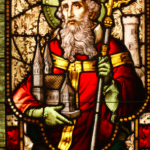On Ash Wednesday this year, I had the opportunity to offer Ashes to Go at the subway stop at 24th and Mission Street in downtown San Francisco.
Three clergy and I donned cassocks and, holding incense and ashes, stood in the large square where riders emerge from the underground tunnels.
Our church, St. Gregory’s of Nyssa, has offered Ashes to Go at this subway stop for several years now, so people have come to anticipate it. Trains arrived at the station every 10 minutes, and a wave of commuters stood in line, heads bowed, as we traced crosses in the center of their foreheads and whispered,
From dust you have come, to dust you shall return.
Turn from your sins and be faithful to God.
It was a holy experience. Tenderly touching strangers’ faces in the midst of an anonymous crowd, leaning in close to whisper in penitents’ ears in spite of the noise, offering a sacred ritual in the center of a public space marked with graffiti and litter.
I applied so many crosses to peoples’ foreheads, it took days for the black soot to disappear from my fingertips.
Every time I washed my hands, I remembered that the ashes we use each Ash Wednesday come from the ashes of the branches used for Palm Sunday the year before. On Palm Sunday, when Jesus rode into Jerusalem, the people thought he was coming as the new king who would rescue them from the tyranny of the Romans. As Jesus rode through the crowd, they yelled, “Hosanna! Hosanna!”
Hosanna comes from the Hebrew “Hosai – na,” which meant, “Please save me.” (Adding the suffix “Na” to a word in Hebrew intensifies the emotion — in this case, desperation — of it.) The word evolved into Hosanna, which came to mean, “Praise God, we have been saved.”
Jesus was coming to save them, but not in the way they expected — or, in the end, wanted. He wasn’t coming to overturn their political system and restore them to power. He was coming to rescue them from their spiritual suffering, and restore them to their loving God from whom they had long been estranged.
A week later, the same people who cheered Jesus in the streets led him to his death, and jeered at him as he was dying an agonizing death, hanging bloodied, bruised and naked on a cross.
Palm branches turn to ashes.
Hosanna turns to How dare you.
Our hearts turn from the Life and Love we’re offered in God, and crave political power, physical possessions and greedy gain instead.
Ash Wednesday’s ashes represent that we are Finite. Grieved. Repentant. And Fickle.
Unfortunately, palm branches didn’t just turn to ashes once, two thousand years ago. They still do.
It’s easy to condemn the mercurial mob that went from shouting, “Hosanna” to the Jesus they treated as their king, to screaming, “Crucify him!” less than one week later, treating him as a common criminal instead. But all too often, evangelical Christians’ palm branches still turn to ashes.
Like the crowd in Jerusalem two thousand years ago, we still want a Jesus who will lead — or at least endorse — a singular political party.
We still want a Jesus who will restore us to power.
We still want a God who will galvanize a majority, give us the rights we demand, and lead us to an election night victory.
Jesus calls us to be meek, but we want to be mighty.
Jesus calls us to make peace, but we weaponize instead.
Jesus calls us to hunger and thirst for righteousness, but instead we crave the opportunity to prove how right our narrow-minded views are.
Jesus calls us to pray for and bless our enemies, but we mock and name-call instead.
Jesus says that those who mourn will be comforted — but we skip the mourning and go straight to comforting ourselves with huge homes and flat screen TV’s and fast food and SUVs that get 12 miles to the gallon, while our brothers and sisters around the world are starving to death.
We claim to be Christians, we wave our palm branches at Jesus, we say he’s the one to save us. But in the end, we reject Jesus and throw our fronds in the flames of our selfish, egotistical, mean hearts. Instead of following in the footprints of Jesus that lead to the self-sacrificing love of Calvary, we run to join the mob that’s warring for political power, stooping to their same level of corrupt tactics and hateful rhetoric.
We want saving from other ideas, other people, outside threats and anything that threatens our comfortable way of life. But Jesus didn’t come to save us from any of that. Jesus didn’t come to save us from others.
The ashes that lingered on my fingertips long after Ashes to Go remind me that what Jesus really came to save us from…
…is ourselves.












